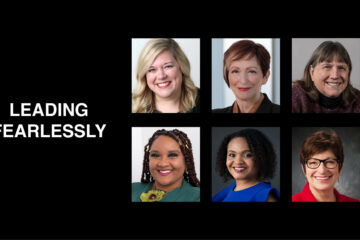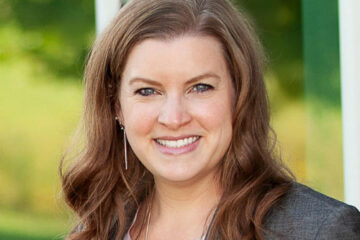Editor’s note: To usher in the new year, we asked more than a dozen women who live across the state to write about their hopes, dreams, and things to keep in mind for women’s advancement and gender equity. Read the full collection of columns here.
By Dawn Oliver Wiand and Deann Cook

When the Iowa Women’s Foundation was founded in 1994, there was — and still is — no other organization in the state dedicated solely to improving the economic success of women and girls.
Like most other places in the U.S., Iowa’s data about the well-being of women and girls can present two contradictory stories. Some women are doing well:
- More women are entering the labor force.
- More women are attending and graduating from college.
- More women are enlisting in the military.
- Girls are reaching greater proficiency in academics, including science, technology, engineering and mathematics.
- Women’s life expectancy has increased.
But, in contrast, even more women and girls are facing barriers and setbacks to achievement and prosperity:
- More than two-thirds of all Iowa female-headed households struggle economically.
- The median family income for female-led households, (defined as no spouse, with children under 18) is $28,610, compared with that for male households (no spouse present), which is $45,828. By comparison, the median income for married-couple families is $97,993.
- More than 60% of service sector workers are female with an approximate average hourly pay of $13.36.
- Only 22% of executives in publicly traded companies and 25% of executives in private for-profit companies in Iowa are women.
Since COVID, the situation is even more dire, with women leaving the workforce in record numbers. This is happening both nationwide and in Iowa. According to Iowa Workforce Development, 53,400 women have left the workforce since 2020. It is critical to build solutions that can help women to return to the workforce and become economically self-sufficient.
Through community-led change, we are working to break down the barriers to economic success ensuring that all women and girls have the knowledge, access and wraparound support they need to obtain a living wage and fulfilling career. IWF’s work is informed and guided by community stakeholders who identified six barriers to economic success for Iowa’s women and girls. Child care was identified as the primary barrier, leading IWF to focus additional resources on shattering this barrier first.
Below are a few examples of work that’s been done to shatter the child care barrier:
- The public now more readily recognizes child care as an economic issue.
- The Building Community Child Care Solutions network was established and has grown to over 60 communities working together to increase access to quality affordable child care.
- In partnership with the Iowa Economic Development Authority, a full-time employer engagement director is working with over 100 businesses who choose to make an investment in child care for their employees.
- The child care workforce is being supported through community partnerships with bonuses and increased wages.
- Elected officials have made child care a priority and are working to get child care legislation on the books that supports Iowa’s working families at the national and state levels.
We are increasing the availability of quality affordable child care. The goal is a growing and thriving child care industry enabling more women to obtain employment and stay in the workforce.
– Dawn Oliver Wiand, outgoing president and CEO, Iowa Women’s Foundation
It is a privilege to follow in Dawn’s footsteps to build on the convening, advocacy and funding niche that Iowa Women’s Foundation has carved to shatter barriers to women’s economic success. The work of the foundation in recent years to bring together stakeholders from policymakers to businesses to child care providers to families has made a significant impact in Iowa.
Powerful partnerships have been developed in the effort to create more accessible, affordable and reliable child care options for Iowans. There remains significant work to do for these efforts to reach all the families who experience economic constraints from lack of child care. However, our state now has a strong multisector team committed to continuous improvement. IWF remains a dedicated partner, advocate and funder to advance this critical work.
The six identified barriers to women’s economic success are child care, housing, transportation, education/training, mentoring and employment. All of these barriers currently affect the ability of Iowa women, especially those in low-income households, to achieve financial self-sufficiency.
The trait of Iowans to get on with what’s necessary without disclosing the depths of their personal challenges may mean we are not aware of these individual struggles. That doesn’t mean Iowa women are “fine.”
Child care is a necessary first step to achieve employment – without it, there is no opportunity for mothers of young children to seek the majority of available jobs. Beyond child care lie additional layers of barriers, from the practical, like transportation and housing, to the connections needed to grow job skills and advance careers through additional training and mentoring.
In 2023, IWF will take the lessons learned from coalition-building, partnering and advocating in the child care space to convene Iowa stakeholders to determine where other work can be scaled to shatter additional barriers and create an even stronger support framework to advance women’s achievement of financial self-sufficiency.
Strong households make strong communities. IWF will continue to support Iowa women through the full spectrum of necessary steps needed to enhance their financial growth and resilience. Families benefit from the partnership of many stakeholders in creating structures that build opportunities to strengthen their own abilities and efforts to sustain their households. Attention and investment in these structures now will pay off dividends for generations of Iowa women and girls.
– Deann Cook, incoming president and CEO, Iowa Women’s Foundation
Dawn Oliver Wiand was the president and CEO of the Iowa Women’s Foundation for nearly 10 years. Deann Cook took over the position at the start of 2023, after previously serving as president and CEO of United Ways of Iowa.


